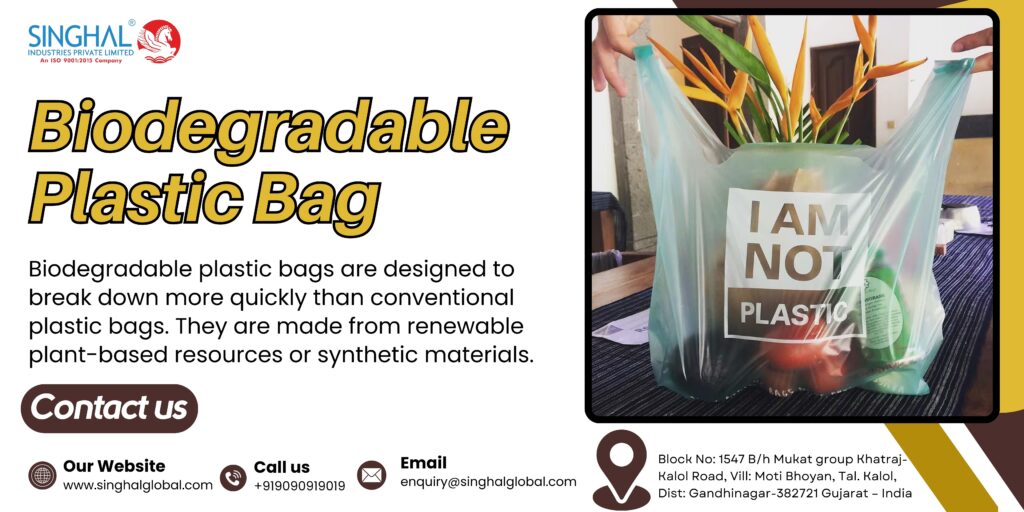The worldwide plastic pollution epidemic has reached unprecedented heights with plastic trash now pervading every aspect of our world—to oceans and rivers, city roads, and distant countryside. Conventional plastic bags, used extensively to carry groceries, pack items, and dispose of waste, last hundreds to thousands of years before disintegrating, spilling toxic chemicals into the environment. In relation to this crisis, innovative use of biodegradable plastic bags provides an expectation alternative, which provides a new solution for waste and stability problems. Singhal Industries established themselves as leading Biodegradable carry bags exporters in Ahmedabad.
The Problem with Traditional Plastic Bags
Standard plastic bags, which usually originate from polyethylene, are the most important contributors in the environmental loss. Billions of tons of plastic are manufactured annually, much of which is for one-time use. Plastic bags are light, cheap, and extremely resilient, but their resilience is a double-sided coin. Though they fulfill their purpose for a brief time, they remain in the environment for centuries to degrade. It puts tremendous pressure on the ecosystem, wildlife and human health.
Plastic also lowers microplastics over time, which finds its way in the food chain through marine organisms, along with aquatic lives, threatened people who eat seafood. Pollution generated from plastic waste has emerged as one of the largest environmental issues in the world, to find alternative solutions to large authorities, companies and workers.
What Are Biodegradable Plastic Bags?
Biodegradable plastic bags are produced from plant-based materials, including starch, corn, or sugarcane, or from synthetic polymers that are engineered to degrade faster than regular plastics. The bags biodegrade naturally by biological means, assisted by microorganisms such as bacteria, fungi, and algae. The biological degradation process breaks the material into water, carbon dioxide and biomass, without toxic residues in the environment.
There are two primary forms of biodegradable plastic: compostable and biodegradable. Compostable plastic aims to decompose under certain conditions, for example in industrial fertilizer systems, while biodegradable plastic is designed to decompose in the environment over time. Both are a promising alternative for traditional plastic waste, although the frequency of degradation and power will depend on materials and environmental conditions. There are numerous Bio degradable plastic bag manufacturers in Gujarat but Singhal Industries stand out best amongst others.
Benefits of Biodegradable Plastic Bags
Environmental Impact Minimization: The main advantage of biodegradable plastic bags is their slightest environmental effects. In contrast to regular plastic bags, which take centuries to decompose in the environment, biodegradable bags are formulated to decompose within a much shorter period—between a few months and a few years. This minimizes the buildup of plastic waste in landfills, oceans, and other environments.
In addition, biodegradable bags tend to be produced using renewable sources like sugarcane or corn, thereby minimizing their fossil gasoline reliance. This stands in stark remedy from the petrochemical technique used in manufacturing preferred plastics, thereby lowering ordinary manufacturing carbon emissions.
Wildlife Risk Reduction: Animals often confuse plastic bags with food, so that it will cause them to be ingested, entangle them, or even kill them. Sea turtles, whales, and birds are most vulnerable to consuming plastics, which block the digestive tune and result in suffocation. Switching to biodegradable alternatives minimizes the danger of harming wildlife significantly given that these styles of bag take much less time to break down and are not as continual a hazard to animals. Biodegradable plastic bags manufacture always manufactures the best product as per the customer’s requirement.
Enhanced Waste Management: Biodegradable plastic bags can substantially contribute to greater waste management structures. As against everyday plastics, which aren’t biodegradable and demand high-priced recycling strategies or many years-lengthy landfilling, biodegradable bag are damaged down into organic remember that may be composted or implemented as fertilizer in farming environments. This presents the opportunity for a circular economic system wherein natural waste is converted into effective materials instead of occupying landfill space.
Consumer Consciousness and Accountability: The trend for biodegradable plastic bags has also contributed to greater consumer consciousness of the environmental toll of using plastics. As consumers realize the environmental cost of their own buying behavior, there has been a greater demand for green products, including Biodegradable plastic bags manufacturer. This drive towards green consumerism is making industries come up with creative and sustainable solutions, which will in turn drive society at large toward a movement to reduce waste.
Challenges and Considerations
Although biodegradable plastic bags have great environmental benefits, there are considerations and challenges that need to be addressed for them to become successful in revolutionizing waste management.
Cost and Scalability: Biodegradable plastic bags tend to be more costly to manufacture compared to traditional plastic bags, mainly because of the raw materials and production processes used. The elevated value of production might also discourage their mass use, mainly in developing nations in which less expensive plastic bags are the same old. Nevertheless, as the demand for biodegradable products grows and production turns into more green, charges will drop, and the bags turns into extra low-cost on a international level.
Decomposition Conditions: Biodegradable plastic does now not decay frivolously in each environment. A few biodegradable baggage call for sure situations—like high temperature, humidity, or oxygen availability—that are possibly no longer to be had everywhere. For example, biodegradable baggage decompose faster under business composting conditions but burn up tons longer in natural media like forests or oceans. This poses a hassle to green waste management due to the fact that not all biodegradable bag might smash down at the equal pace in every place.
Absence of Infrastructure: Absence of Infrastructure: Although biodegradable plastic bags are a hopeful substitute, they are effective handiest if right waste management infrastructure exists.. For example, biodegradable bags have to be processed in special composting facilities capable of delivering conditions for decomposition. In regions without such infrastructure, biodegradable bags might fail to degrade as expected and even end up being a source of environmental pollution.
The Future of Biodegradable Plastic Bags
The future of biodegradable plastic bags depends on sustained innovation in materials science, waste management infrastructure, and consumer behavior. As research advances, biodegradable plastics may become more affordable, versatile, and widely available. Governments can take a leading role by enacting regulations and incentives that promote the use of biodegradable alternatives while also advancing comprehensive recycling and composting systems.
In addition, consumer education on the correct disposal of biodegradable bags and the need for waste reduction can enhance the advantages of this technology. If these issues can be addressed, biodegradable plastic bags can transform waste management by offering a more sustainable and environmentally friendly alternative to plastic pollution.
Conclusion
In summary, although biodegradable plastic bags are not a solution to all problems that come with plastic waste, they are an important step towards the more sustainable future. In handling environmental and health problems around regular plastic bags, biodegradable bags provide a solution to the global cleaner environment, healthy wildlife and more efficient waste management systems.
Frequently Asked Questions (F&Q)
How do biodegradable plastic bags break down?
Biodegradable plastic bags are degraded by the activities of microorganisms (such as fungi and bacteria) that break down the plastic components into water, carbon dioxide, and biomass.
How long do biodegradable plastic bags take to decompose?
Biodegradable plastic bags also normally decompose within 3 to 6 months if placed in an environment that has plenty of microbes, e.g., in a composting plant, much sooner compared to normal plastics which can remain for centuries.
Can biodegradable plastic bags be used for waste disposal?
Yes, biodegradable plastic bags can be utilized for waste disposal, but disposed of in composting systems and not in regular trash cans to degrade efficiently.
Do biodegradable plastic bags degrade faster in landfills?
Yes, biodegradable plastic bags are made with the intention of degrading quicker than normal plastics in landfills, typically in months to years compared to hundreds of years for normal plastics.









